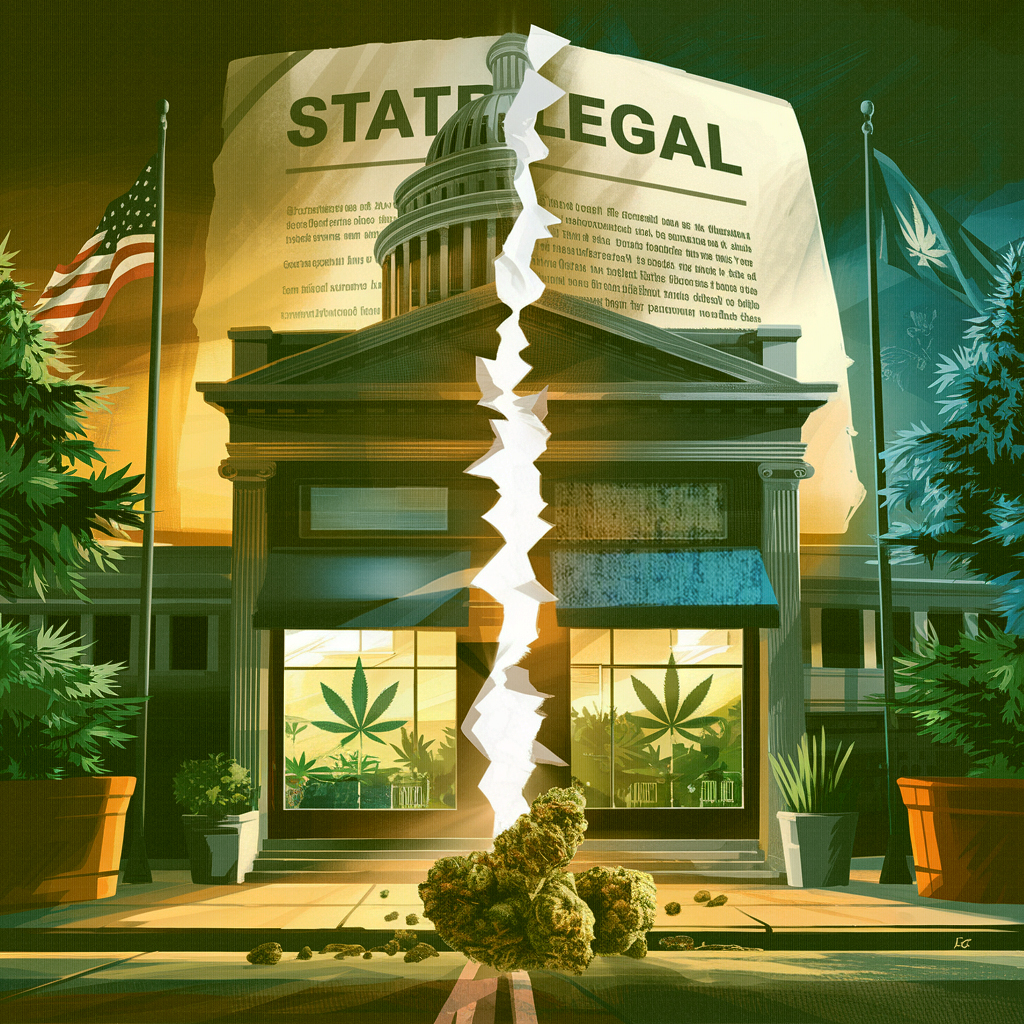The clash between federal prohibition and state legalization leaves cannabis businesses in legal limbo, with the Lucas Sirois case highlighting the urgent need for federal reform.
The case of Lucas Sirois, a Maine cannabis entrepreneur, has thrown the volatile relationship between federal and state marijuana laws into sharp relief. Sirois, a 44-year-old from Farmington, faces federal charges for allegedly operating a multimillion-dollar cannabis empire that stretched beyond Maine’s borders, implicating him in money laundering, tax evasion, and bank fraud. While Maine has embraced cannabis legalization, federal prohibition still looms over the industry, allowing for selective prosecution and inconsistent cannabis enforcement strategies.
This case underscores the precarious nature of cannabis businesses that attempt to navigate a legal framework riddled with contradictions. As more states move toward legalization, the disconnect between state policies and federal law continues to create enforcement gaps, compliance challenges, and legal battles that threaten the legitimacy of the industry.
Maine’s Cannabis Industry: A Pioneering but Challenging Market
Maine has been a progressive force in cannabis policy for decades. It decriminalized small amounts of cannabis as early as 1976, legalized medical marijuana in 1999, and expanded its medical cannabis program in 2009 to establish a regulated system for cultivation and distribution. In 2016, voters approved adult-use legalization, and by 2020, retail sales were fully operational.
Despite Maine’s structured regulatory approach, challenges persist. The state enforces strict licensing and tracking requirements to curb black-market activity, yet the enduring conflict between federal and state law has left many cannabis operators in a precarious position. The lack of federal guidance on cannabis enforcement has resulted in an unpredictable legal landscape, where businesses that believe they are compliant under state law can still find themselves facing federal scrutiny.
The Sirois Case: A Legal Quagmire Caught in a Policy Rift
Lucas Sirois’ case embodies the turmoil created by the inconsistency between federal law and state legalization. Federal prosecutors allege that Sirois cultivated and sold cannabis illegally, circumventing state oversight and using a network of shell corporations to launder more than $13 million in proceeds. The 2021 indictment implicated 13 individuals in what the federal government describes as an illicit cannabis enforcement case involving interstate trafficking, fraud, and organized crime tactics.
Sirois, however, maintains that his operations adhered to Maine’s legal framework. His defense cites the Rohrabacher-Farr Amendment, which restricts the Department of Justice from interfering with state-legal medical cannabis markets. The prosecution counters that the charges extend beyond medical cannabis protections and include financial crimes and illicit sales that violate both state and federal law.
The case has already seen several legal twists, with lower courts siding with the federal government, arguing that the evidence suggests clear violations of financial and interstate commerce laws. This battle reflects a broader issue within cannabis enforcement—the inconsistent application of federal authority over state-compliant businesses.
The Federal-State Clash: Legal Ambiguity and Selective Prosecution
The Sirois case illustrates the deep-seated struggle between state legalization efforts and federal prohibition. Under the principle of federalism, state law generally yields to federal authority when conflicts arise. However, the evolution of cannabis policy in the U.S. demonstrates that this legal doctrine is not always absolute in practice.
As public sentiment shifts, states act as policy incubators, often defying outdated federal statutes to align with voter demands. With cannabis, this resistance has reached a tipping point—so many states have rejected federal prohibition that nationwide cannabis enforcement is becoming impractical. The federal government has largely allowed state-legal markets to operate, but cases like Sirois’ show that enforcement remains selective and inconsistent, often targeting individuals rather than addressing systemic regulatory flaws.
Economic and Financial Implications of Federal Prohibition
Maine’s legal cannabis market has grown substantially since adult-use sales launched, generating jobs and tax revenue. However, businesses must still contend with an unregulated black market, which undercuts legal operators and deprives the state of tax revenue. Federal banking restrictions exacerbate these challenges, as cannabis businesses remain largely cash-based due to banks’ fear of violating federal money laundering laws.
The federal crackdown on illicit operations like Sirois’ also underscores the broader issue of financial access in the cannabis sector. The inability to access traditional banking services increases the risk of money laundering allegations, as businesses resort to complex financial workarounds to remain operational. The proposed SAFER Banking Act, if passed, could mitigate these risks by allowing legal cannabis businesses access to traditional banking, potentially reducing cases like Sirois’ and bringing much-needed clarity to cannabis enforcement protocols.
What’s Next? Policy Reform and Supreme Court Implications
Sirois’ case is now poised to reach the U.S. Supreme Court, potentially setting a precedent for federal intervention in state-legal cannabis markets. If the Court rules in his favor, it could curtail federal prosecution of state-compliant operators and reinforce the legitimacy of state cannabis programs. Conversely, a ruling upholding the federal charges could signal a renewed crackdown on businesses that push the boundaries of state law, reinforcing federal supremacy in cannabis enforcement cases.
With more states moving toward full legalization, the urgency for federal reform is growing. The Biden administration has signaled some willingness to reassess cannabis policy, but progress remains slow, and legislative efforts such as the MORE Act and the SAFER Banking Act remain stalled in Congress. The outcome of Sirois’ case could either accelerate or hinder reform efforts, shaping the future of cannabis law in America.
The Future of Cannabis Enforcement and Industry Stability
The Lucas Sirois case is more than just another legal battle; it represents a pivotal moment in the broader debate over cannabis policy and federal overreach. The case highlights the inherent instability of an industry that operates in legal limbo, vulnerable to selective prosecution and regulatory contradictions.
As the nation watches this case unfold, one thing is certain: the current patchwork approach to cannabis enforcement is unsustainable. Without comprehensive federal reform, cannabis businesses—whether fully compliant or pushing the boundaries—will continue to face legal uncertainties. The future of the industry hinges on whether lawmakers will address these conflicts head-on or allow the legal gray area to persist, leaving businesses and consumers caught in the crossfire.

***
GreenPharms is more than just a dispensary. We are a family-owned and operated company that cultivates, processes, and sells high-quality cannabis products in Arizona. Whether you are looking for medical or recreational marijuana, we have something for everyone. From flower, edibles, concentrates, and topicals, to accessories, apparel, and education, we offer a wide range of marijuana strains, products and services to suit your needs and preferences. Our friendly and knowledgeable staff are always ready to assist you and answer any questions you may have. Visit our dispensaries in Mesa and Flagstaff, or shop online and get your order delivered to your door. At GreenPharms, we are cultivating a different kind of care.
Follow us on social media





